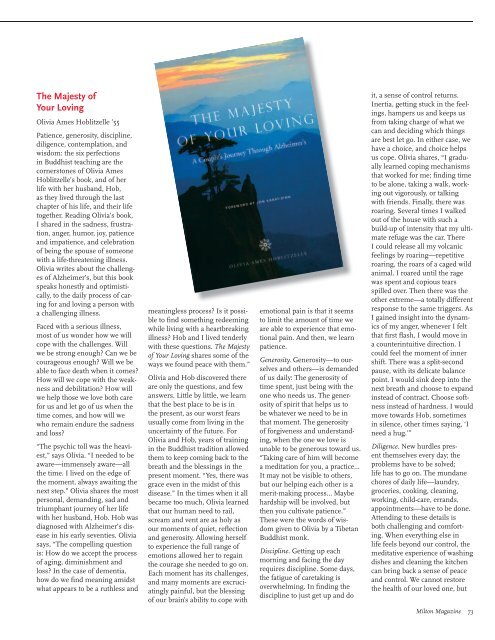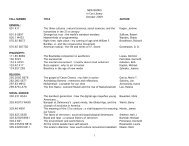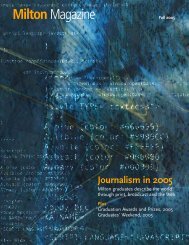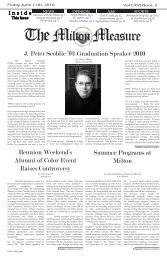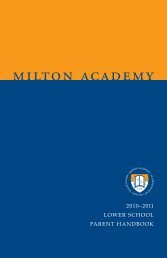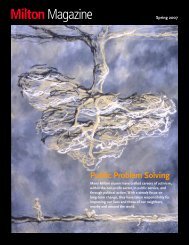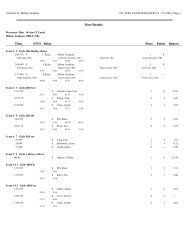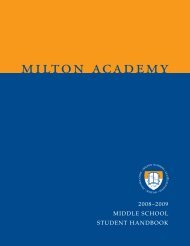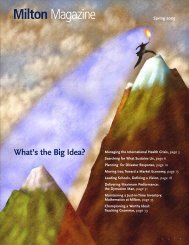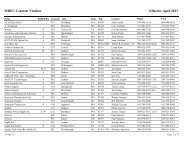Milton Magazine - Milton Academy
Milton Magazine - Milton Academy
Milton Magazine - Milton Academy
- No tags were found...
Create successful ePaper yourself
Turn your PDF publications into a flip-book with our unique Google optimized e-Paper software.
The Majesty ofYour LovingOlivia Ames Hoblitzelle ’55Patience, generosity, discipline,diligence, contemplation, andwisdom: the six perfectionsin Buddhist teaching are thecornerstones of Olivia AmesHoblitzelle’s book, and of herlife with her husband, Hob,as they lived through the lastchapter of his life, and their lifetogether. Reading Olivia’s book,I shared in the sadness, frustration,anger, humor, joy, patienceand impatience, and celebrationof being the spouse of someonewith a life-threatening illness.Olivia writes about the challengesof Alzheimer’s, but this bookspeaks honestly and optimistically,to the daily process of caringfor and loving a person witha challenging illness.Faced with a serious illness,most of us wonder how we willcope with the challenges. Willwe be strong enough? Can we becourageous enough? Will we beable to face death when it comes?How will we cope with the weaknessand debilitation? How willwe help those we love both carefor us and let go of us when thetime comes, and how will wewho remain endure the sadnessand loss?“The psychic toll was the heaviest,”says Olivia. “I needed to beaware—immensely aware—allthe time. I lived on the edge ofthe moment, always awaiting thenext step.” Olivia shares the mostpersonal, demanding, sad andtriumphant journey of her lifewith her husband, Hob. Hob wasdiagnosed with Alzheimer’s diseasein his early seventies. Oliviasays, “The compelling questionis: How do we accept the processof aging, diminishment andloss? In the case of dementia,how do we find meaning amidstwhat appears to be a ruthless andmeaningless process? Is it possibleto find something redeemingwhile living with a heartbreakingillness? Hob and I lived tenderlywith these questions. The Majestyof Your Loving shares some of theways we found peace with them.”Olivia and Hob discovered thereare only the questions, and fewanswers. Little by little, we learnthat the best place to be is inthe present, as our worst fearsusually come from living in theuncertainty of the future. ForOlivia and Hob, years of trainingin the Buddhist tradition allowedthem to keep coming back to thebreath and the blessings in thepresent moment. “Yes, there wasgrace even in the midst of thisdisease.” In the times when it allbecame too much, Olivia learnedthat our human need to rail,scream and vent are as holy asour moments of quiet, reflectionand generosity. Allowing herselfto experience the full range ofemotions allowed her to regainthe courage she needed to go on.Each moment has its challenges,and many moments are excruciatinglypainful, but the blessingof our brain’s ability to cope withemotional pain is that it seemsto limit the amount of time weare able to experience that emotionalpain. And then, we learnpatience.Generosity. Generosity—to ourselvesand others—is demandedof us daily: The generosity oftime spent, just being with theone who needs us. The generosityof spirit that helps us tobe whatever we need to be inthat moment. The generosityof forgiveness and understanding,when the one we love isunable to be generous toward us.“Taking care of him will becomea meditation for you, a practice…It may not be visible to others,but our helping each other is amerit-making process… Maybehardship will be involved, butthen you cultivate patience.”These were the words of wisdomgiven to Olivia by a TibetanBuddhist monk.Discipline. Getting up eachmorning and facing the dayrequires discipline. Some days,the fatigue of caretaking isoverwhelming. In finding thediscipline to just get up and doit, a sense of control returns.Inertia, getting stuck in the feelings,hampers us and keeps usfrom taking charge of what wecan and deciding which thingsare best let go. In either case, wehave a choice, and choice helpsus cope. Olivia shares, “I graduallylearned coping mechanismsthat worked for me; finding timeto be alone, taking a walk, workingout vigorously, or talkingwith friends. Finally, there wasroaring. Several times I walkedout of the house with such abuild-up of intensity that my ultimaterefuge was the car. ThereI could release all my volcanicfeelings by roaring—repetitiveroaring, the roars of a caged wildanimal. I roared until the ragewas spent and copious tearsspilled over. Then there was theother extreme—a totally differentresponse to the same triggers. AsI gained insight into the dynamicsof my anger, whenever I feltthat first flash, I would move ina counterintuitive direction. Icould feel the moment of innershift. There was a split-secondpause, with its delicate balancepoint. I would sink deep into thenext breath and choose to expandinstead of contract. Choose softnessinstead of hardness. I wouldmove towards Hob, sometimesin silence, other times saying, ‘Ineed a hug.’”Diligence. New hurdles presentthemselves every day; theproblems have to be solved;life has to go on. The mundanechores of daily life—laundry,groceries, cooking, cleaning,working, child-care, errands,appointments—have to be done.Attending to these details isboth challenging and comforting.When everything else inlife feels beyond our control, themeditative experience of washingdishes and cleaning the kitchencan bring back a sense of peaceand control. We cannot restorethe health of our loved one, but<strong>Milton</strong> <strong>Magazine</strong> 73


